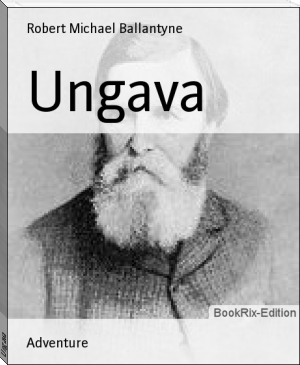Ungava - Robert Michael Ballantyne (distant reading txt) 📗

- Author: Robert Michael Ballantyne
Book online «Ungava - Robert Michael Ballantyne (distant reading txt) 📗». Author Robert Michael Ballantyne
CHAPTER EIGHT.
BRYAN'S ADVENTURE WITH A POLAR BEAR, ETCETERA.
Ice, ice, ice! everything seemed to have been converted into ice when the day broke on the following morning and awoke the sleepers in the camp. A sharp frost during the night, accompanied by a fall of snow, had, as if by magic, converted spring into winter. Icy particles hung upon and covered, not only the young leaves and buds of the bushes, but the branches also, giving to them a white and extremely airy appearance. Snow lay on the upper sides of the canoes, and weighed heavily on the tent, causing its folds, once seemingly so pure and white, to look dirty by contrast. Snow lay on the protruding legs of the men, and encircled the black spot where rested the ashes of last night's brilliant fire. Ice grated on the pebbles of the shore; ice floated on the sea; icy hummocks and mounds rose above its surface; and icebergs raised their pinnacles on the far-off horizon, and cut sharply into the bright blue sky.
It was cold, but it was not cheerless; for when Eda put out her head at the curtain doorway of the tent, and opened her eyes upon the magic scene, the sun's edge rose above the horizon, as if to greet her, and sent a flood of light far and near through the spacious universe, converting the sea into glass, with islands of frosted silver on its bosom. It was a gorgeous scene, worthy of its great Creator, who in His mysterious working scatters gems of beauty oftentimes in places where there is scarce a single human eye to behold their excellence.
Although the sea was covered with ice, there were, nevertheless, several lanes of open water not far from the shore; so that when Stanley called a council, composed of Frank Morton, Dick Prince, and Massan, it was agreed unanimously that they should attempt to proceed. And it was well that they did so; for they had not advanced many miles, winding their way cautiously among the canals of open water, when they doubled a promontory, beyond which there was little or no ice to be seen, merely a few scattered fragments and fields, that served to enhance the beauty of the scene by the airy lightness of their appearance in contrast with the bright blue of the sea and sky, but did not interrupt the progress of the travellers. The three canoes always maintained their relative positions during the journey as much as possible. That is to say, Frank and the two Indians went first in the small canoe, to lead the way, while the two large canoes kept abreast of each other when the open water was wide enough to permit of their doing so. This, besides being more sociable, enabled the two crews to join in the chorus of those beautiful songs with which they frequently enlivened the voyage.
During all this day, and for many days following, they continued to enjoy fine weather and to make rapid progress. Sometimes the ice was pretty thick, and once or twice they narrowly escaped being nipped by collapsing masses, which caused them to jump out, hastily throw the baggage on the ice, and haul the canoes out of the water. On these occasions the men proved themselves to be sterling fellows, nearly all of them being cool, prompt, and collected in the moment of danger. No doubt there were exceptions. La Roche, when any sudden crisis of danger arose, usually threw himself blindly over the side of the canoe on to the ice with the lightness and agility of a harlequin. He recked not whether he came down on his head or his feet, and more than once nearly broke his neck in consequence of his precipitancy. But La Roche was no coward, and the instant the first burst of excitement was over he rushed to render effective assistance. Bryan, too, although not so mercurial as La Roche, was apt to lose self-command for about five minutes when any sudden danger assailed him, so that he frequently sat still, staring wildly straight before him, while the others were actively unloading the canoes; and once, when the danger was more critical than usual, having sat till the canoe was empty, and paid no attention to a prompt, gruff order to jump ashore, he had been seized by the strong arms of Gaspard and tossed out of the canoe like a puppy dog. On these occasions he invariably endeavoured to make up for his fault by displaying, on recovery, the most outrageous and daring amount of unnecessary recklessness,--uttering, at the same time, an amazing number of strange expressions, among which "Tare an' ages!" "Och! murder!" and several others less lucid in signification, predominated. Chimo was always first ashore, and instantly wheeled round to greet Eda, who was also _always_ second, thanks to the strong and prompt arm of Francois, who sat just in front, and by tacit agreement took her under his special charge. As for Mrs Stanley, the arm that was rightfully her own, and had been her shield in many a scene of danger, proved ever ready and able to succour the "first volunteer" to Ungava.
At times the sea was quite free of ice, and many miles were soon added to the space which separated the little band of adventurers from the rest of the human world. Their encampments varied according to the nature of the coast, being sometimes among pine-trees, or surrounded by dwarf willows; at other times on the bare sand of the sea-shore; and occasionally at the extremity of long-projecting capes and promontories, where they had to pitch their tent and make their beds in the clefts of the solid rock. But wherever they laid them down to rest--on the rock, or on the sand, or within the shade of the forest--it was always found, as Mrs Stanley remarked of the first night's encampment, that they were extremely comfortable and eminently snug.
They were successful, too, in procuring an ample supply of fresh provisions. There were ducks and geese of various kinds, and innumerable quantities of plover, cormorants, gulls, and eider-ducks, the eggs of which they found in thousands. Many of these birds were good for food, and the eggs of most of them, especially those of the eider-duck, were excellent. Reindeer were also met with; and, among other trophies of his skill as a hunter, Frank one day brought in a black bear, parts of which were eaten with great gusto by the Esquimaux and Indians, to the immense disgust of Bryan, who expressed his belief that the "haythens was barely fit to live," and were most justly locked out from society in "thim dissolate polar raygeons." There were many seals, also, in the sea, which put up their ugly, grotesque heads ever and anon, gazed at the canoes with their huge, fishy eyes, as in surprise at the sight of such novel marine monsters, and then sank slowly beneath the wave. These animals were never molested, out of respect to the feelings of the two Indians, who believed them to be gods, and assured Stanley that the destruction of one would infallibly bring down ill-luck and disaster on the heads of the party. Stanley smiled inwardly at this, but gave orders that no seals should be shot-- an order which all were very willing to obey, as they did not require the animals either for food or any other purpose. Several white polar bears were seen, but they also were spared, as they require a great deal of shot to kill them, if not hit exactly behind the ear; and besides, neither their bodies nor skins were of any use to the travellers.
Thus all went favourably for a time. But life is a chequered story, and the sun of prosperity does not always shine, as we shall see.
One fine morning, as they were paddling cheerfully along in the neighbourhood of Cape Jones, it struck Mr Stanley that he might prove the correctness of his sextant and other instruments before entering upon the country which to most of the party was _terra incognita_. This was the more necessary that he could not depend on the guidance of Oostesimow and Ma-Istequan, they having travelled only once, long ago, through part of the country, while the latter part of it was totally unknown to them. It was one of those beautiful mornings that are peculiar to arctic regions, when the air is inexpressibly still, and all inanimate nature seems hushed in profound repose--a repose which is rather rendered more effective than otherwise by the plaintive cries of wild-fowl or the occasional puffing of a whale. There was a peculiar brilliancy, too, in the atmosphere, caused by the presence of so many fields and hummocks of white ice, looming fantastically through a thin, dry, gauze-like haze, which, while it did not dim the brightness of the solar rays, lent an additional charm to every object by shrouding it in a veil of mystery.
On passing the point the men ceased rowing, and proceeded to solace themselves with a five-minutes' pipe--an indulgence which voyageurs always claim as their due after a long spell at the oars or paddles.
"Put ashore here, Massan," said Stanley, turning to the guide; "I shall take an observation, if possible, and you can set the men to hunt for eggs. We shall want them, as the larder is rather low just now."
Massan muttered assent, and, shouting to the other canoe to put ashore, ran alongside the rocks.
"You'd better hail the little canoe," said Stanley, as he landed. "I shall want Mr Morton to assist me."
Massan stepped upon an elevated rock, and, shading his eyes with his hands, looked earnestly ahead where he observed the little canoe almost beyond vision, and just going to double a point of land. Transferring his hands to his mouth, he used them as a trumpet, and gave forth a shout the like of which had never startled the echoes of the place before.
"It's no use, sir," said Massan; "he's past hearin'. I'm afeerd that they're off in the direction o' the White Bear Hills, in hopes o' gittin' a shot."
"Try again, Massan," urged Stanley; "raise your pipe a little higher. Perhaps it will reach them."
Massan shook his head. "Try it, Bryan," he said, turning to the Irishman, who was sitting on a rock leisurely filling his short, black pipe.
"Is it to halloo ye want me?" replied Bryan, rising. "Shure the great gun of Athlone itself could niver hold a candle to ye, Massan, at yellin'; but I'll try, anyhow;" and putting his hands to his mouth he gave forth a roar compared to which Massan's was nothing. There was a sort of crack in the tone of it, however, that was so irresistibly ridiculous that the whole party burst incontinently into a fit of laughter. Loud though it was, it failed to reach the ears of those in the little canoe, which in a few seconds doubled the point and disappeared.
"Ah, bad luck to it!" said Bryan, in disgust; "the pipe's damaged intirely. Small pace to ye, Bob Mahone; for shure it was howlin' and screechin' at your wake like a born scrandighowl that broke it."
"Never mind, lad; what remains of it is not bad," said





Comments (0)